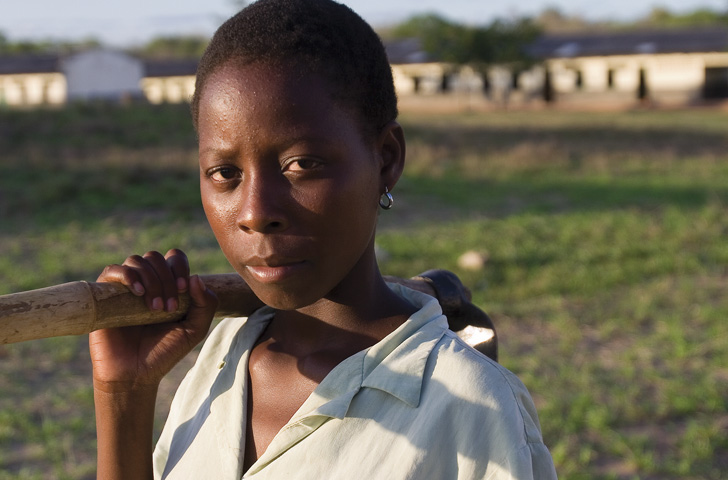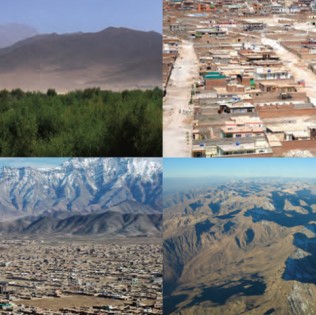by TheOGM
Published on April 5th, 2010
In Mozambique Farmers Seed Economic Growth in Remote Northern Province
In Mozambique, AKFC support enabled farmer Sifa Roderigues to attend the Agrarian School of Bilibiza, in Cabo Delgado. Now she works with other farmers to help improve food security and fight chronic malnutrition, which remain significant challenges here. “We’re now learning how to take care of our land so that it will be healthier, more fertile, ” she says. (Photo courtesy: AKDN/Lucas Cuervo Moura)
When vandals burned down the shop he kept in a straw shanty under the mango tree in Nangulu village, Sacuru Canduru Ausse lost his only source of income.
Cash is scarce is this part of Cabo Delgado, the northern-most province of Mozambique. Most families live on the equivalent of 30 cents per day. Approximately 70 to 80 percent of the population is illiterate, and average life expectancy is 38 years. With poor roads, unreliable electricity and little communications infrastructure, development here is a daunting challenge. However, the region is rich in natural resources, and efforts to revitalize the rural economy under a Canadian-supported program are beginning to take root.
After the fire, Sacuru rebuilt his shop, using cement this time, and he expanded his stock to include drought-resistant seeds and farming implements to fill a growing demand. He recently opened a second shop. His thriving business is a signal of the success of a multi-faceted approach to rural development that is slowly but surely creating new income for extremely poor communities here.
After 20 years of war that pushed Mozambique’s population into some of the deepest poverty in the world, the Aga Khan Foundation Canada (AKFC) and the Canadian International Development Agency (CIDA) are working to help farmers reap the wages of peace.
Since 2003, AKFC has been working with 160 villages in five particularly poor and isolated districts to become less vulnerable to crop failure and to earn money from their produce so that they can invest in the education and care of their children.
With so much to be done, the Foundation is taking a long-term perspective; it is focusing on building the skills and ability of local people to be the drivers of development in the area. For the first time, these communities are working together to identify common needs and to find and manage sustainable solutions.
This is the most significant sign of hope, says Zara Merali, a program manager with the Foundation. “Communities have a clearer picture of where they want to go and how to be the leaders in that change,” she says.
The results have been impressive: 100 percent of children in the area have been vaccinated; 67 percent are enrolled in primary school, up from 13 percent since 2003; 69 percent are sleeping under malaria-preventing bed nets, up from 7 percent.
Women are emerging as leaders.
Sifa Roderiguez was selected by her community to attend the Agrarian School of Bilibiza in Cabo Delgado. Now she works with a group of famers to help improve food security and chronic malnutrition, which remain the biggest challenge for households here. “We’re learning how to take care of our land so that it will be healthier, more fertile.”
In fact, more families are eating two to three meals a day. In 2006, households generated over $640,000 in income through cash crops compared to an estimated $30,000 the year before.
With more cash in the economy, Sacuru can now afford to invest in the future of his family. With the income from his second shop, he is now able to send his two brothers, wife and son to school to get the education he never had.
To find out more about the work of Aga Khan Foundation Canada, please visit akfc.ca or call 1-800-267-2532.
Did you enjoy this article?

 Being Santa
Being Santa Afghanistan Is Recreating Itself - Prince Mostapha Zaher Restores National Unity with Environmental Consciousness.
Afghanistan Is Recreating Itself - Prince Mostapha Zaher Restores National Unity with Environmental Consciousness. Making Education Count
Making Education Count Our Vision is an Ocean Free of Plastic Pollution
Our Vision is an Ocean Free of Plastic Pollution ExxonMobil: A Powerful Contributor to United Way
ExxonMobil: A Powerful Contributor to United Way